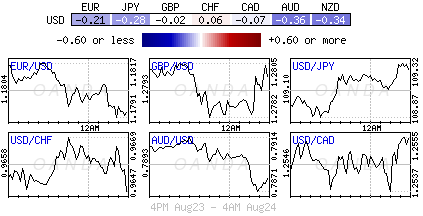Thursday August 24: Five things the markets are talking about
The majority expect ECB’s Draghi to refrain from talking about the timing of exit from ultra-loose monetary policy at the Kansas City Fed’s Jackson Hole symposium, which starts today, however, it is still worthwhile watching out for news as the three day annual meet of G10 central bankers is always good for a surprise or two.
The ‘mighty’ U.S dollar is finding it difficult to gain meaningful traction over the past couple of sessions as investors digest U.S political uncertainty ahead of important speeches from central bankers – both the Fed’s Yellen and ECB’s Draghi take center stage tomorrow – President Trump threatened on Tuesday night to shut down the government to secure funding for a wall on the Mexican border and even raised doubts about a new NAFTA deal being reached.
Ms. Yellen is scheduled to speak about financial stability at 10 am EDT Friday, while ECB’s Draghi is set to give a speech at 3 pm EDT.
1. Stocks mixed results
In Japan, the Nikkei (-0.4%) share average fell to a four-month low overnight, dragged down by stateside losses and a stronger yen. The broader Topix index fell -0.5%.
In South Korea, the Kospi index increased +0.4%, while down-under, Australia’s S&P/ASX 200 Index added +0.1%.
In Hong Kong, the Hang Seng Index rallied +0.5% as the market reopened after being shut on Wednesday, supported by robust gains in financial and property stocks.
In China, stocks fell the most in nearly two-weeks on Thursday, as China Unicom tumbled after rallying earlier in the week as excitement over state enterprise reforms cooled. The blue-chip CSI300 index fell -0.6%, while the Shanghai Composite Index lost -0.5%.
In Europe, indices are trading a tad higher in light summer trade with cyclicals’ helping many European names rise.
U.S stocks are set to open in the black (+0.1%).
Indices: Stoxx600 +0.4% at 375.5, FTSE +0.3% at 7407, DAX +0.3% at 12211, CAC-40 +0.4% at 5133, IBEX-35 +0.5% at 10391, FTSE MIB +0.8% at 21800, SMI +0.1% at 8964, S&P 500 Futures +0.1%
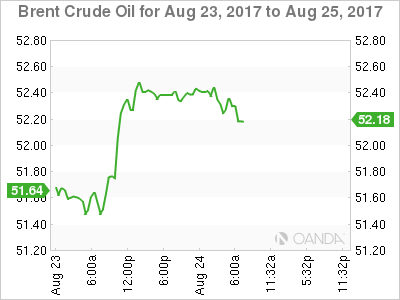
2. Oil steady as storm heads into Gulf of Mexico
Ahead of the U.S open, oil prices are steady, holding on to most of their recent gains after another fall in U.S crude inventories yesterday indicated a tighter market. Also supporting prices is the threat of a tropical storm heading towards oil producing facilities in the Gulf of Mexico.
Brent crude is down -5c at +$52.52, while U.S light crude (WTI) is also -5c lower at +$48.36 a barrel.
Note: Both contracts had rallied more than +1% yesterday, supported by potential output disruptions from the Gulf of Mexico storm Tropical Depression Harvey. Operators in the area are already closing down platforms for precautionary measures.
U.S crude oil production hit +9.53m barrels bpd last week; it’s highest since July 2015 and is up over +13% from their most recent low in mid-2016.
Despite elevated production levels, EIA data yesterday showed that U.S crude stocks fell last week and that gas stocks were also down – crude inventories fell by -3.3m barrels in the week ending Aug. 18 to +463.17m barrels, down -13.5% from March’s record levels.
Note: OPEC is to hold a joint OPEC, non-OPEC Joint Ministerial Monitoring Committee (JMMC) meeting on Sept 22 – All options will be on the table including production cuts and extension of current agreement. Planning to invite Nigeria and Libya to meeting.
Gold prices have nudged lower overnight, giving up some of its gains made after President Trump’s threat of a government shutdown. Spot gold is down -0.2% at +$1,287.21 an ounce. The market is focused on Jackson Hole rhetoric.
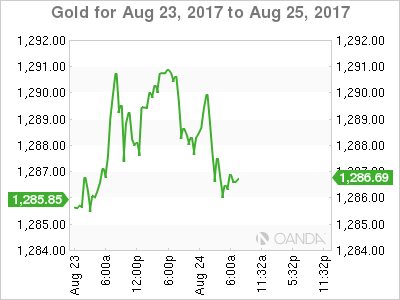
3. Yields trade a tight range ahead of central bank meet
Yesterday, Canadian bonds ended a recent losing streak as fixed-income prices rose amid growing uncertainty on the future of Nafta following comments made by Trump.
The yield for Canada’s two-year bonds fell -2 bps to +1.259%, while 10-year product was -4 bps lower at +1.883%. Canadian fixed-income continues to underperform U.S Treasury’s amid ongoing muted summer trading conditions on the broader market.
U.S debt prices also rallied Wednesday, as combative rhetoric from President Trump this week pressured equities while fuelling demand for assets seen as a safe haven. The yield on U.S 10-year notes is at +2.185%, down from Tuesday’s pre speech levels of +2.215%.
Elsewhere, Germany’s 10-year Bund yield rallied +1 bps to +0.38%, the first advance in more than a week, while the U.K’s 10-year Gilt yield increased +2 bps to +1.074%.
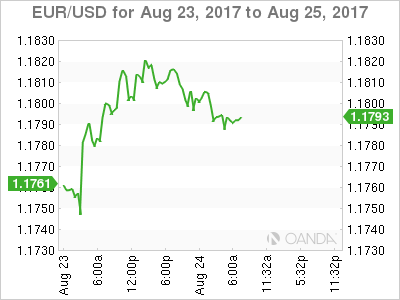
4. Dollar flounder ahead of Yellen’s speech Friday
The EUR (€1.1790) has extended its gains outright, helped yesterday by data showing that U.S new-home sales fell sharply in July and by a provisional eurozone PMI survey on manufacturing activity that beat expectations.
Improvements in the eurozone economy, combined with heightened political uncertainty in both the U.S and the U.K will continue to support the single unit on pull backs – EUR/GBP continues to trade north of the psychological €0.92 handle.
Draghi’s Jackson Hole speech is being seen as a potential mover as it will have more impact as it relates directly towards monetary policy. Consensus believes ‘no’ changes are expected in the QE measures, however attention will be paid to any remarks on the EUR’s strength.
Sterling (£1.2800) remains under persistent pressure, driven by concerns about Brexit, while USD/JPY (¥109.32) trades within a tight 120-pip range over the week heading into Jackson Hole conference. Any USD strength has been countered by geopolitical risk as U.S/South Korea continues their war exercises.
Bullish bets on the Chinese yuan are maintained at three-year highs. The currency has gained about +4.1% outright this year, supported by the People’s Bank of China (PBoC) guidance of the daily trading band and controls on capital outflows.
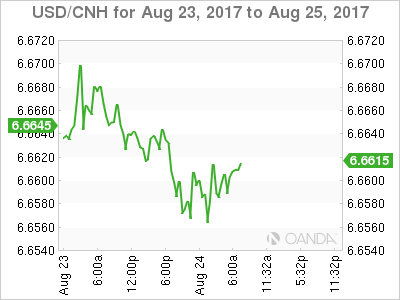
5. U.K business investment slows as Brexit fuels uncertainty
Data this morning showed that U.K business investment slowed and posted no growth in Q2 – a sign that uncertainty linked to Brexit negotiations and June’s general election may have weighed on firms’ long-term plans.
Capital spending by businesses was unchanged compared with the preceding quarter, as well as the corresponding quarter of 2016, standing at +£43.8B.
U.K Ministers have suggested the U.K will seek a “transition agreement’ to give businesses time to adapt, but mixed signals on the shape of such a deal have kept companies on edge.
Other data showed that U.K GDP data for Q2 expanded by +0.3% on the quarter, a slight improvement on the +0.2% seen in Q1. It was in line with expectations and on an annualized basis; the U.K economy grew by +1.2%. Household expenditure and government spending drove Q2 expansion.
